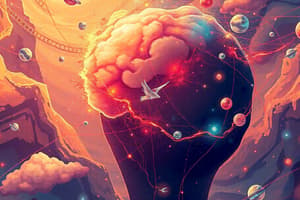Podcast
Questions and Answers
What is the primary focus of psychology?
What is the primary focus of psychology?
- Understanding behaviors and mental processes (correct)
- Exploring cultural diversity in human behavior
- The study of physical stimuli and human sensations
- Analyzing maladaptive behaviors during childhood
Which term describes the strength of the relationship between two variables?
Which term describes the strength of the relationship between two variables?
- Relationship coefficient
- Meta-analysis
- Correlation (correct)
- Bayesian statistic
Height and weight are examples of which type of correlation?
Height and weight are examples of which type of correlation?
- Negative correlation
- Inverse correlation
- Spurious correlation
- Positive correlation (correct)
Which perspective of psychology examines societal and cultural influences on behavior?
Which perspective of psychology examines societal and cultural influences on behavior?
What does the biological perspective of psychology emphasize?
What does the biological perspective of psychology emphasize?
What does maladaptive behavior refer to in psychology?
What does maladaptive behavior refer to in psychology?
In which type of correlation do two variables move in opposite directions?
In which type of correlation do two variables move in opposite directions?
Which psychological perspective primarily studies observable behavior?
Which psychological perspective primarily studies observable behavior?
What is the term for the tendency of groups to reach a consensus without considering alternative viewpoints?
What is the term for the tendency of groups to reach a consensus without considering alternative viewpoints?
Which type of culture prioritizes individual goals over group interests?
Which type of culture prioritizes individual goals over group interests?
Which of the following is classified as a Big 5 personality trait?
Which of the following is classified as a Big 5 personality trait?
What term best describes a stable pattern of thoughts, behaviours, and emotions in an individual?
What term best describes a stable pattern of thoughts, behaviours, and emotions in an individual?
In Freud's personality theory, which component deals with unconscious drives and impulses?
In Freud's personality theory, which component deals with unconscious drives and impulses?
What psychological condition is characterized by a loss of interest and significant depressive symptoms?
What psychological condition is characterized by a loss of interest and significant depressive symptoms?
How is a mental disorder generally defined?
How is a mental disorder generally defined?
What concept refers to a shared belief in a group that suppresses dissenting opinions?
What concept refers to a shared belief in a group that suppresses dissenting opinions?
Which type of attachment did infants exhibit if they did not care when their caretakers left or returned?
Which type of attachment did infants exhibit if they did not care when their caretakers left or returned?
What term describes the process by which children learn society's expected behaviors and rules?
What term describes the process by which children learn society's expected behaviors and rules?
What is the term for the sequential unfolding of genetically influenced behavior and physical characteristics?
What is the term for the sequential unfolding of genetically influenced behavior and physical characteristics?
In the Harlow study with monkeys, what was demonstrated to be an innate need?
In the Harlow study with monkeys, what was demonstrated to be an innate need?
The Stanford Prison Experiment demonstrated the influence of what factor on behavior?
The Stanford Prison Experiment demonstrated the influence of what factor on behavior?
What phenomenon describes Bill's inaction when he sees a person laying on the side of the road?
What phenomenon describes Bill's inaction when he sees a person laying on the side of the road?
In the Asch study, what was the main focus of the research?
In the Asch study, what was the main focus of the research?
Which of the following terms best describes the behavior of assuming others have already taken action in emergency situations?
Which of the following terms best describes the behavior of assuming others have already taken action in emergency situations?
What best describes behavior that prevents a person from functioning normally and may cause suffering?
What best describes behavior that prevents a person from functioning normally and may cause suffering?
Which disorder is characterized by a common pattern in serial killers involving rule-breaking and a lack of empathy?
Which disorder is characterized by a common pattern in serial killers involving rule-breaking and a lack of empathy?
What mental health condition is indicated by frequent and uncontrollable worries about multiple aspects of life?
What mental health condition is indicated by frequent and uncontrollable worries about multiple aspects of life?
Which behavior might suggest a person is unable to control impulses and endangers others?
Which behavior might suggest a person is unable to control impulses and endangers others?
What is a distinguishing feature of borderline personality disorder compared to other anxiety disorders?
What is a distinguishing feature of borderline personality disorder compared to other anxiety disorders?
What is the primary function of a reinforcer in behavior modification?
What is the primary function of a reinforcer in behavior modification?
Giving a student a sticker for good grades is an example of which type of reinforcement?
Giving a student a sticker for good grades is an example of which type of reinforcement?
Explicit memory is best defined as:
Explicit memory is best defined as:
What type of learning refers to acquiring knowledge without conscious awareness?
What type of learning refers to acquiring knowledge without conscious awareness?
Decay theory posits that forgetting happens because:
Decay theory posits that forgetting happens because:
Confabulation can best be described as:
Confabulation can best be described as:
Emotional intelligence includes the ability to:
Emotional intelligence includes the ability to:
Which of the following statements about punishers is true?
Which of the following statements about punishers is true?
What do we store in our minds that allows us to recognize a dog we have never seen before?
What do we store in our minds that allows us to recognize a dog we have never seen before?
What is the term for the tendency to overestimate the predictability of an event after it has occurred?
What is the term for the tendency to overestimate the predictability of an event after it has occurred?
According to the facial feedback hypothesis, what effect does smiling have on a person's emotions?
According to the facial feedback hypothesis, what effect does smiling have on a person's emotions?
Which part of the brain quickly assesses danger, and which part corrects for the situation?
Which part of the brain quickly assesses danger, and which part corrects for the situation?
What is the function of mirror neurons in our brain?
What is the function of mirror neurons in our brain?
What does the term 'locus of control' refer to?
What does the term 'locus of control' refer to?
Which of the following correctly describes the role of the amygdala in emotional response?
Which of the following correctly describes the role of the amygdala in emotional response?
Which statement about confirmation bias is true?
Which statement about confirmation bias is true?
Flashcards
Psychology definition
Psychology definition
The study of behavior and mental processes, and how they are influenced by physical state, mental state, and environment.
Correlation
Correlation
A measure of how strongly two variables are related.
Positive correlation
Positive correlation
Relationship where both variables increase or decrease together.
Sociocultural perspective
Sociocultural perspective
Signup and view all the flashcards
Biological perspective
Biological perspective
Signup and view all the flashcards
Psychology
Psychology
Signup and view all the flashcards
Height and weight correlation
Height and weight correlation
Signup and view all the flashcards
Negative correlation
Negative correlation
Signup and view all the flashcards
Reinforcement vs. Punishment
Reinforcement vs. Punishment
Signup and view all the flashcards
Positive Reinforcement
Positive Reinforcement
Signup and view all the flashcards
Explicit Memory
Explicit Memory
Signup and view all the flashcards
Implicit Memory
Implicit Memory
Signup and view all the flashcards
Decay Theory
Decay Theory
Signup and view all the flashcards
Confabulation
Confabulation
Signup and view all the flashcards
Emotional Intelligence
Emotional Intelligence
Signup and view all the flashcards
Fluid Intelligence
Fluid Intelligence
Signup and view all the flashcards
Avoidant Attachment
Avoidant Attachment
Signup and view all the flashcards
Socialization
Socialization
Signup and view all the flashcards
Maturation
Maturation
Signup and view all the flashcards
Contact Comfort
Contact Comfort
Signup and view all the flashcards
Social Roles
Social Roles
Signup and view all the flashcards
Diffusion of Responsibility
Diffusion of Responsibility
Signup and view all the flashcards
Conformity
Conformity
Signup and view all the flashcards
Perception
Perception
Signup and view all the flashcards
Concepts
Concepts
Signup and view all the flashcards
Hindsight Bias
Hindsight Bias
Signup and view all the flashcards
Facial Feedback Hypothesis
Facial Feedback Hypothesis
Signup and view all the flashcards
Amygdala
Amygdala
Signup and view all the flashcards
Prefrontal Cortex
Prefrontal Cortex
Signup and view all the flashcards
Mirror Neurons
Mirror Neurons
Signup and view all the flashcards
Locus of Control
Locus of Control
Signup and view all the flashcards
What is the difference between the amygdala and the prefrontal cortex in terms of assessing threats?
What is the difference between the amygdala and the prefrontal cortex in terms of assessing threats?
Signup and view all the flashcards
Abnormal Behavior
Abnormal Behavior
Signup and view all the flashcards
Psychological Disorder
Psychological Disorder
Signup and view all the flashcards
Antisocial Personality Disorder
Antisocial Personality Disorder
Signup and view all the flashcards
Generalized Anxiety Disorder
Generalized Anxiety Disorder
Signup and view all the flashcards
What is the difference between 'abnormal behavior' and 'psychological disorder'?
What is the difference between 'abnormal behavior' and 'psychological disorder'?
Signup and view all the flashcards
Groupthink
Groupthink
Signup and view all the flashcards
Individualistic vs. Collectivistic Cultures
Individualistic vs. Collectivistic Cultures
Signup and view all the flashcards
Big 5 Personality Trait
Big 5 Personality Trait
Signup and view all the flashcards
Personality
Personality
Signup and view all the flashcards
Id in Freud's Theory
Id in Freud's Theory
Signup and view all the flashcards
Major Depressive Disorder
Major Depressive Disorder
Signup and view all the flashcards
Mental Disorder
Mental Disorder
Signup and view all the flashcards
What is a mental disorder?
What is a mental disorder?
Signup and view all the flashcards
Study Notes
Psychology Final Exam - Quizizz
- Psychology: Defined as the discipline focused on behavior and mental processes, influenced by physical state, mental state, and external environment.
- Physical stimuli: Studied as they influence human sensations and perceptions.
- Human behavior: Understood through the study of humankind and the importance of culture's role in its diversity.
- Relationship coefficient: Measures how strongly two variables are related.
- Correlation: Height and weight are an example.
- Psychological perspectives: Sociocultural - how society and culture influence behaviors.
- Biological perspective: Impact of genes and body's influence on behavior
- Learning perspective : How learning shapes behavior
- Cognitive perspective: Focuses on thoughts and processes.
- Reinforcement: Increases behavior.
- Punishment: Decreases behavior.
- Positive reinforcement : Adds a desirable stimulus for desirable behavior to strengthen it.
- Classical conditioning: Learning through association.
- Positive punishment: Adds an undesirable stimulus to weaken a behavior
- Negative Punishment: Removing a desirable stimulus to weaken a behavior
- Memory types: Explicit (conscious recollection) and implicit (unconscious learning)
- Forgetting: Decay theory - memories fade; other information replacing old; no cues to recall.
- Confabulation: Confusion of events, believing something never happened.
- Intelligence: Ability to recognize emotions in oneself and others, express those emotions clearly, and regulate them
- Mental sets: Stored concepts in the mind, allowing for recognition of familiar entities
- Hindsight bias: Overestimate the likelihood of predicting outcomes after they occur
- Confirmation bias: Overestimate the likelihood of predicted outcome after the outcome is known
- Groupthink: Tendency for groups to not express dissent/disagreements
- Personality traits: Distinctive behaviors, thoughts, motives and feelings
- Locus of control: Whether individual believes actions are within their control
- Mental disorder: A disturbance in thinking, emotion, behavior, with self-destruction, impairment in functioning and lack of control.
- Socialization: Process of learning societal rules and behavior.
- Maturation: Sequential unfolding of genetically influenced behavior and physical characteristics.
- Stanford Prison Experiment: Experiment demonstrating powerful influence of social roles on behavior
- Diffusion of responsibility: When assuming someone else will act in a given situation
- Conformity: Tendency to conform to a group
- Emotional Intelligence: Recognizing, expressing, and regulating one's own and other's emotions.
- Asch Study: Study on conformity
- Personality: Distinctive behaviors, thoughts, motives and feelings.
- Ivan Pavlov's study: Unconditioned stimulus - meat powder, unconditioned response - salivation.
- Spinal Cord: Collection of neurons and supportive tissue; extends from base of brain and protected by bones.
- Nervous system: Central and peripheral nervous systems
- Neurons: Transmit information to, from, and within nervous system
- Facial Feedback Hypothesis: Smiling causes positive emotional feelings
- Mirror neurons: Fire when performing an action or watching someone else.
- Mental disorder examples:
- Borderline personality disorder (BPD)
- Generalized anxiety disorder (GAD)
- Antisocial personality disorder (ASPD)
- Major depressive disorder (MDD)
- Emotional disorders: Panic disorder; Phobias; Generalized Anxiety Disorder, Depression
Studying That Suits You
Use AI to generate personalized quizzes and flashcards to suit your learning preferences.




